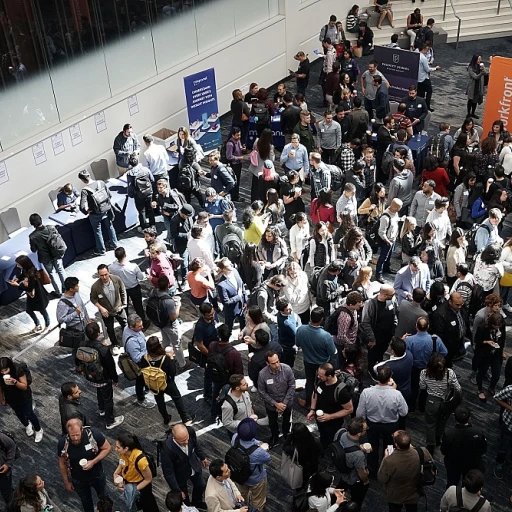
Understanding AI Coaching in Employee Development
The Emergence of AI in Coaching and Development
The rise of artificial intelligence in recent years has revolutionized how coaching and development are approached within organizations. AI coaching, in particular, presents a unique opportunity for elevating employee performance and engagement. By leveraging sophisticated algorithms, AI-driven tools can offer personalized learning experiences and immediate feedback, enabling a more dynamic and effective development strategy.Integration with Traditional Methods
AI coaching does not replace traditional methods; instead, it complements them by providing data-driven insights and real-time performance management. This integration is essential as it maintains a human-centric approach while adding efficiency through AI's capabilities. Coaches can now focus on more personal aspects of development, as AI handles much of the data analysis and routine feedback. Consequently, organizations can benefit from a balanced blend of technology and human interaction in their employee development programs.Tools and Techniques Used in AI Coaching
The tools associated with AI-powered coaching are varied, including platforms for personalized learning, behavior change tracking, and performance measure assessments. These tools enable organizations to craft more effective training programs and monitor employee progress, thus ensuring that leadership and talent development are continuously aligned with corporate objectives. Real-time feedback mechanisms are also a crucial component, allowing employees to adjust their performance promptly and efficiently. Furthermore, AI-driven systems can identify patterns and predict potential issues before they escalate, enhancing overall performance and engagement in the workplace. This proactive approach is invaluable for leadership development and personal growth, as it provides insights that might not have been readily available through conventional methods. In conclusion, understanding AI coaching within the framework of employee development involves appreciating its role as a catalyst for enhanced learning and performance. It positions organizations to better manage their talent and fosters an environment of continuous improvement. For more on how productivity coaching can enhance workplace efficiency, consider checking out this insightful resource.Benefits of AI Coaching for Employee Engagement
Advantages of AI Coaching for Enhancing Employee Involvement
AI coaching offers a multitude of benefits in elevating employee engagement and driving organizational success. By implementing these cutting-edge tools, organizations can create an atmosphere conducive to growth and productivity. AI-powered coaching provides real-time feedback, enabling employees to understand their performance more clearly and make informed decisions. This immediate interaction fosters a culture of continuous learning and improvement, essential for employee engagement.- Personalized Learning Experiences: AI tools tailor their coaching to meet individual learning and development needs. This customized approach addresses unique strengths and weaknesses, facilitating more impactful employee development.
- Enhanced Performance Management: Utilizing data-driven insights, AI coaching helps track and optimize employee performance, aiding in effectively managing talent and improving overall work quality.
- Timely and Constructive Feedback: Employees receive constructive criticism and praise promptly, contributing to positive behavior change and reinforcing desired performance outcomes.
- Empowering Leadership Development: AI-driven coaching contributes to the growth of future leaders by identifying potential leadership qualities and nurturing them through targeted training programs.
- Efficiency in Resource Allocation: With AI’s ability to process data efficiently, organizations can allocate their resources more effectively, attending to areas requiring immediate intervention and assistance.
Challenges in Implementing AI Coaching
Overcoming Barriers in AI-Driven Coach Implementation
Implementing AI coaching in the workplace presents a unique set of challenges that organizations need to navigate to effectively enhance employee engagement and development. While AI-powered tools offer remarkable potential for personalized learning and real-time performance management, companies must address several hurdles to fully reap the benefits.
Firstly, the integration of artificial intelligence into existing corporate training and talent management frameworks can be complex. Organizations need to assess their current systems and ensure compatibility with AI technologies. This often requires investing in new tools and software, which can be both costly and time-consuming.
Additionally, data privacy and protection remain a significant concern. Employees may have reservations about the amount of personal data collected and how it is utilized. Companies must prioritize transparency and establish clear guidelines around data use to build trust and promote employee engagement.
There is also the issue of change management. As with any technological advancement, introducing AI-driven coaching requires a significant shift in organizational culture. Leadership must champion this change, helping employees understand the benefits and easing any resistance. Tailored training programs and continuous learning development initiatives can aid this transition.
Moreover, ensuring the human touch in AI coaching is crucial. While AI can provide valuable, data-driven insights and personalized feedback, it cannot replace the nuanced understanding of human coaches. Balancing technological benefits with human oversight can improve behavior change and leadership development.
Finally, organizations often struggle with measuring the true impact of AI on employee performance. Establishing clear metrics and regularly conducting performance reviews can help track the benefits and identify areas for improvement. Achieving this balance will be key to successful AI coaching implementation in the future.
For those seeking alternatives to enhance employee engagement, reviewing alternatives to traditional methods could provide further insights.
Case Studies: Success Stories of AI Coaching
Real-World Applications of AI Coaching
In the realm of employee development, AI coaching has emerged as a transformative tool, driving significant improvements in performance and engagement. Organizations that have embraced AI-driven solutions are witnessing notable changes in how they approach training and development. Here, we explore some success stories that highlight the impact of AI coaching in various corporate settings.
Boosting Employee Performance Through Personalized Learning
One of the most compelling examples of AI coaching is its ability to offer personalized learning experiences. Companies have leveraged AI to tailor training programs that align with individual employee needs and career goals. This approach not only enhances skill acquisition but also fosters a culture of continuous learning. Employees report feeling more engaged and motivated, as the training is relevant and directly applicable to their roles.
Enhancing Leadership Development and Talent Management
AI-powered coaching tools have also made significant strides in leadership development. By analyzing data-driven insights, organizations can identify potential leaders and provide them with targeted coaching. This has led to more effective talent management, as employees are groomed for leadership roles through customized development plans. The real-time feedback provided by AI systems ensures that aspiring leaders receive the guidance they need to refine their skills and behaviors.
Streamlining Performance Management and Feedback
Incorporating AI into performance management processes has streamlined how feedback is delivered and received. AI tools facilitate real-time feedback, allowing employees to make immediate adjustments and improvements. This continuous feedback loop has replaced traditional performance reviews, making the process more dynamic and responsive. Employees appreciate the timely insights, which contribute to a more engaged and productive workforce.
Driving Behavior Change and Employee Engagement
AI coaching has proven effective in driving behavior change, a critical component of employee engagement. By providing personalized coaching, AI systems help employees develop new skills and adopt positive work habits. This has led to increased job satisfaction and a stronger commitment to organizational goals. As a result, companies report higher retention rates and a more cohesive work environment.
These case studies underscore the potential of AI coaching to revolutionize employee development. By harnessing the power of artificial intelligence, organizations can create a more engaged, skilled, and motivated workforce, ultimately leading to improved business outcomes.
Evaluating the Effectiveness of AI Coaching
Measuring Success and Gathering Data
Evaluating the effectiveness of AI-powered coaching in employee development requires a comprehensive approach that considers various factors. Organizations often focus on performance management that reflects tangible results from AI-driven coaching initiatives. The collection and analysis of real-time feedback help measure the true impact on employee performance. One method to assess success is by utilizing data-driven insights. These insights are gathered from employee performance reviews and training programs. By examining the behavior change and skills improvement of employees, organizations can identify areas where AI coaching has significantly contributed to development.Employee Engagement and Learning Development
AI coaching tools are instrumental in enhancing employee engagement. They offer personalized learning experiences that cater to the unique needs of employees. This personalized approach not only boosts motivation but also promotes a culture of continuous learning. The improvements in learning development can be associated with high levels of employee engagement. Such coaching tools also contribute to leadership development by providing managers with the skills necessary to lead effectively. Leadership not only involves managing teams but also fostering an environment where talent development is prioritized. By focusing on coaching leadership capabilities, organizations can ensure sustained talent management.Addressing Challenges and Maximizing Benefits
The journey to effective AI coaching isn't without its challenges, yet by understanding these, companies can better capitalize on the advantages. Some obstacles include initial resistance from employees, the time investment required, and integrating existing tools with new AI systems. To overcome these hurdles, continuous training and adjustments in corporate training programs are necessary. Ensuring that AI coaching is seamlessly embedded into performance review processes enhances its value. As a result, employees not only see improvements in short-term performance but also long-term career advancement. The ultimate goal is to create an environment where AI-powered coaching becomes an integral part of the organizational culture. Through this integration, sustained growth and performance improvements are achieved, benefiting both the employees and the company.Future Trends in AI Coaching for Employee Development
Emerging Trends in AI-Driven Coaching
The landscape of employee development is rapidly evolving, with artificial intelligence playing a pivotal role. As organizations continue to explore AI coaching, several trends are emerging that promise to reshape how employees learn and grow.
Personalized Learning Experiences
AI-powered tools are increasingly being used to tailor learning experiences to individual employees. By analyzing data from performance reviews and real-time feedback, AI can identify specific skills gaps and recommend personalized training programs. This data-driven approach ensures that employees receive the most relevant and effective training, enhancing both engagement and performance.
Real-Time Feedback and Continuous Improvement
One of the most significant advantages of AI in coaching is the ability to provide real-time feedback. This immediate response allows employees to make quick adjustments, fostering a culture of continuous improvement. As AI systems become more sophisticated, they will offer more nuanced insights into employee performance, enabling more effective performance management and talent development.
Integration with Leadership Development
AI coaching is not just for entry-level employees. It is increasingly being integrated into leadership development programs. By providing data-driven insights into leadership behaviors and offering personalized coaching, AI helps develop more effective leaders. This integration supports organizations in building strong leadership pipelines, crucial for long-term success.
Enhanced Employee Engagement Through AI
As AI coaching becomes more prevalent, its impact on employee engagement is becoming clearer. By offering personalized learning and development opportunities, AI helps employees feel valued and invested in their growth. This sense of investment can lead to higher levels of engagement and retention, benefiting both employees and organizations.
The Future of AI in Corporate Training
Looking ahead, AI is set to become an integral part of corporate training programs. As AI technologies advance, they will offer even more sophisticated tools for employee development, from virtual reality simulations to AI-driven mentorship programs. Organizations that embrace these technologies will be well-positioned to foster a culture of learning and innovation.













